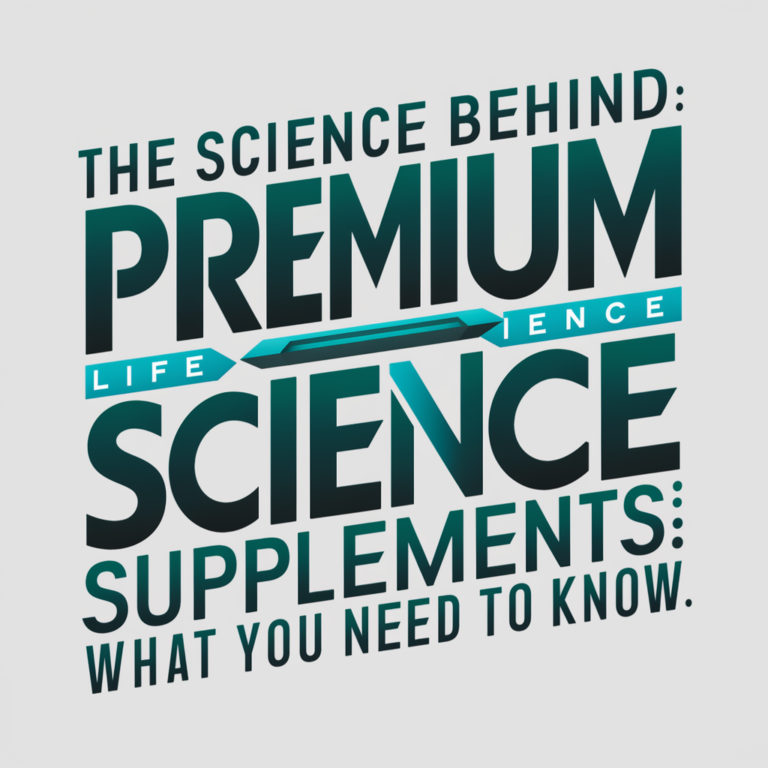Table of Contents
Introduction
In the ever-evolving landscape of health and wellness, premium life science supplements have emerged as a beacon of hope for those seeking to optimize their well-being. As consumers become increasingly health-conscious and proactive about their nutritional needs, understanding the science behind these supplements has become not just important, but essential.
Science Behind Premium Life Science Supplements
This comprehensive guide delves deep into the world of premium supplements, exploring their scientific foundations, what sets them apart from standard options, and how they can potentially impact your health. Whether you’re a seasoned supplement user or just beginning to explore this realm, this article aims to provide you with the knowledge needed to make informed decisions about your health.
Key Insight: The global dietary supplements market size was valued at USD 151.9 billion in 2021 and is expected to expand at a compound annual growth rate (CAGR) of 8.9% from 2022 to 2030, highlighting the growing importance of understanding these products.
Understanding Premium Supplements
Premium supplements represent the pinnacle of nutritional supplementation, distinguished by their high-quality ingredients, rigorous manufacturing processes, and often, a higher price point. But what exactly makes a supplement “premium”?
Characteristics of Premium Supplements:
- Higher Bioavailability: Premium supplements often use forms of nutrients that are more easily absorbed and utilized by the body.
- Purer, More Potent Ingredients: These supplements typically contain higher-quality raw materials with fewer fillers or artificial additives.
- Innovative Formulations: Many premium supplements feature patented or proprietary blends backed by scientific research.
- Transparent Sourcing and Manufacturing: Premium brands often provide detailed information about their ingredient sources and production processes.
- Third-Party Testing: Many premium supplements undergo additional testing by independent laboratories to verify purity, potency, and safety.
| Feature | Standard Supplements | Premium Supplements |
|---|---|---|
| Ingredient Quality | Variable | High-grade, often standardized |
| Bioavailability | Standard forms | Enhanced forms for better absorption |
| Research Backing | Limited | Extensive, often with proprietary studies |
| Manufacturing Standards | Meets basic requirements | Exceeds standards, often with additional certifications |
| Transparency | Basic labeling | Detailed sourcing and processing information |
Key Insight: While premium supplements may come with a higher price tag, their potential for greater efficacy and safety can offer better value in the long run, especially for those with specific health goals or nutritional needs.
Scientific Basis for Premium Supplements
The efficacy of premium supplements is often supported by robust scientific research, setting them apart from many over-the-counter options. This scientific validation provides consumers with greater confidence in the potential benefits of these products.
Types of Scientific Evidence:
- Peer-Reviewed Studies: Research published in reputable scientific journals, subjected to scrutiny by experts in the field.
- Clinical Trials: Controlled studies on human subjects to determine safety and effectiveness.
- In Vitro and In Vivo Experiments: Laboratory studies exploring mechanisms of action at cellular and animal model levels.
- Bioavailability Studies: Research focused on how well the body absorbs and utilizes specific nutrient forms.
- Meta-Analyses: Comprehensive reviews that synthesize data from multiple studies to draw broader conclusions.
Many premium supplement companies invest heavily in research and development, often collaborating with academic institutions or conducting their own clinical trials. This commitment to science not only validates their products but also contributes to the broader understanding of nutrition and health.
Key Insight: A systematic review published in the journal “Nutrients” found that certain premium multivitamin formulations were associated with improved cognitive function in older adults, highlighting the potential of scientifically-formulated supplements to address specific health concerns.
Key Ingredients in Premium Supplements
Premium supplements often feature a sophisticated blend of essential nutrients and innovative compounds. Understanding these ingredients can help consumers make more informed choices about their supplementation.
Common Ingredients in Premium Supplements:
- High-Quality Vitamins and Minerals: Often in their most bioavailable forms, such as methylcobalamin (B12) or chelated minerals.
- Standardized Herbal Extracts: Botanicals processed to ensure consistent potency of active compounds.
- Probiotics and Prebiotics: Beneficial bacteria and the fibers that feed them, often in proprietary blends.
- Omega-3 Fatty Acids: High-purity fish oils or algae-based DHA and EPA.
- Antioxidants: Beyond vitamins C and E, including compounds like CoQ10, astaxanthin, or specialized plant extracts.
- Adaptogens: Herbs like Rhodiola or Ashwagandha, known for their stress-modulating properties.
- Specialized Amino Acids: Such as N-Acetyl Cysteine (NAC) or L-Theanine for specific health benefits.
Key Insight: A study in the “Journal of Nutritional Science” found that a premium multivitamin containing optimized forms of B-vitamins and chelated minerals showed significantly higher blood nutrient levels compared to a standard multivitamin, demonstrating the importance of ingredient quality and form.
Regulatory Framework
While the supplement industry is regulated differently from pharmaceuticals, premium supplements often go beyond basic requirements to ensure safety, efficacy, and quality.
Key Regulatory Aspects:
- Good Manufacturing Practices (GMPs): FDA-mandated standards for dietary supplement production.
- Third-Party Testing: Independent verification of purity, potency, and label claims.
- Adverse Event Reporting: Mandatory reporting of serious adverse events to the FDA.
- Labeling Regulations: Strict guidelines on what claims can be made and how ingredients must be listed.
Premium supplement companies often exceed these baseline requirements, implementing additional quality control measures and transparency practices.
Key Insight: A report by the American Botanical Council found that companies investing in rigorous quality control and third-party certifications saw increased consumer trust and sales, indicating a growing demand for transparency in the supplement industry.
Trends in Premium Supplement Development
The premium supplement market is dynamic, constantly evolving to meet consumer demands and incorporate new scientific findings. Current trends include:
- Personalized Nutrition: Tailored supplement regimens based on genetic testing or individual health profiles.
- Plant-Based and Vegan Formulations: Meeting the needs of the growing plant-based consumer base.
- Sustainable and Eco-Friendly Practices: From ingredient sourcing to packaging materials.
- Nootropics and Cognitive Health: Formulations targeting brain function and mental performance.
- Microbiome Support: Advanced probiotic and prebiotic formulations for gut health.
- Longevity and Anti-Aging: Supplements targeting cellular health and age-related concerns.
Key Insight: A market analysis by Nutrition Business Journal reported that personalized nutrition supplements saw a 35% growth in sales over the previous year, indicating a strong consumer interest in tailored health solutions.
Consumer Considerations
When choosing premium supplements, consumers should consider several factors to ensure they’re making the best choice for their health:
- Personal Health Needs: Consult with a healthcare professional to identify specific nutritional gaps or health goals.
- Quality Indicators: Look for third-party certifications, transparent sourcing, and rigorous testing practices.
- Scientific Support: Evaluate the research backing the product’s claims and ingredients.
- Bioavailability: Consider supplements that use forms of nutrients your body can easily absorb and utilize.
- Potential Interactions: Be aware of how supplements might interact with medications or other supplements you’re taking.
- Lifestyle Factors: Choose supplements that align with your dietary preferences and restrictions.
Key Insight: A consumer survey by the Council for Responsible Nutrition found that 75% of supplement users research product quality before making a purchase, highlighting the importance of transparency and education in the supplement industry.
Challenges and Risks
While premium supplements offer many potential benefits, it’s important to be aware of potential challenges and risks:
- Overreliance on Supplements: Supplements should complement, not replace, a healthy diet and lifestyle.
- Potential for Interactions: Some supplements can interact with medications or other supplements, potentially causing adverse effects.
- Quality Variability: Not all “premium” labeled products meet high standards; research is crucial.
- Cost Considerations: Premium supplements often come with a higher price tag, which may not be accessible to all consumers.
- Risk of Overconsumption: More isn’t always better; excessive intake of certain nutrients can be harmful.
Key Insight: A study in the “New England Journal of Medicine” found that adverse events related to dietary supplements led to an estimated 23,000 emergency department visits annually in the United States, emphasizing the importance of informed and cautious supplement use.
Conclusion
Premium life science supplements represent a cutting-edge approach to nutritional supplementation, offering potentially greater efficacy and safety profiles backed by scientific research and rigorous quality standards. As the field continues to evolve, driven by advances in nutritional science and consumer demand for higher quality products, the potential for these supplements to play a significant role in preventive health and wellness strategies grows.
However, it’s crucial to approach supplementation with a critical eye and in consultation with healthcare professionals. The best outcomes are achieved when premium supplements are used as part of a comprehensive approach to health, including a balanced diet, regular exercise, and other positive lifestyle factors.
As consumers become more educated and discerning, the premium supplement industry is likely to continue its trajectory of innovation and scientific rigor, potentially opening new avenues for personalized nutrition and targeted health interventions. The future of premium supplements holds exciting possibilities for those seeking to optimize their health and well-being.
Science Behind Premium Life Science Supplements Frequently Asked Questions
What makes a supplement “premium”?
Premium supplements are characterized by high-quality, often patented ingredients, rigorous scientific testing, enhanced bioavailability, and transparent manufacturing processes. They typically go beyond basic regulatory requirements and may offer more potent or specialized formulations.
How do I know if a premium supplement is actually high-quality?
Look for third-party certifications, transparent ingredient sourcing, clinical studies supporting the product’s efficacy, and manufacturing processes that exceed industry standards. Reputable companies often provide detailed information about their quality control measures and may offer certificates of analysis upon request.
Can premium supplements replace a healthy diet?
No, premium supplements should not replace a healthy diet. They are designed to complement a balanced diet and healthy lifestyle. Whole foods provide a complex array of nutrients and beneficial compounds that cannot be fully replicated in supplement form. Always prioritize a varied, nutrient-rich diet as the foundation of good health.
Are there any risks associated with taking premium supplements?
No, premium supplements should not replace a healthy diet. They are designed to complement a balanced diet and healthy lifestyle. Whole foods provide a complex array of nutrients and beneficial compounds that cannot be fully replicated in supplement form. Always prioritize a varied, nutrient-rich diet as the foundation of good health.
Are premium supplements worth the higher cost?
The value of premium supplements can vary depending on individual needs. For some, the higher bioavailability and quality of ingredients may justify the cost. However, it’s important to consider personal health goals, budget, and cons ult with a healthcare professional to determine if premium supplements are necessary for your specific situation.

